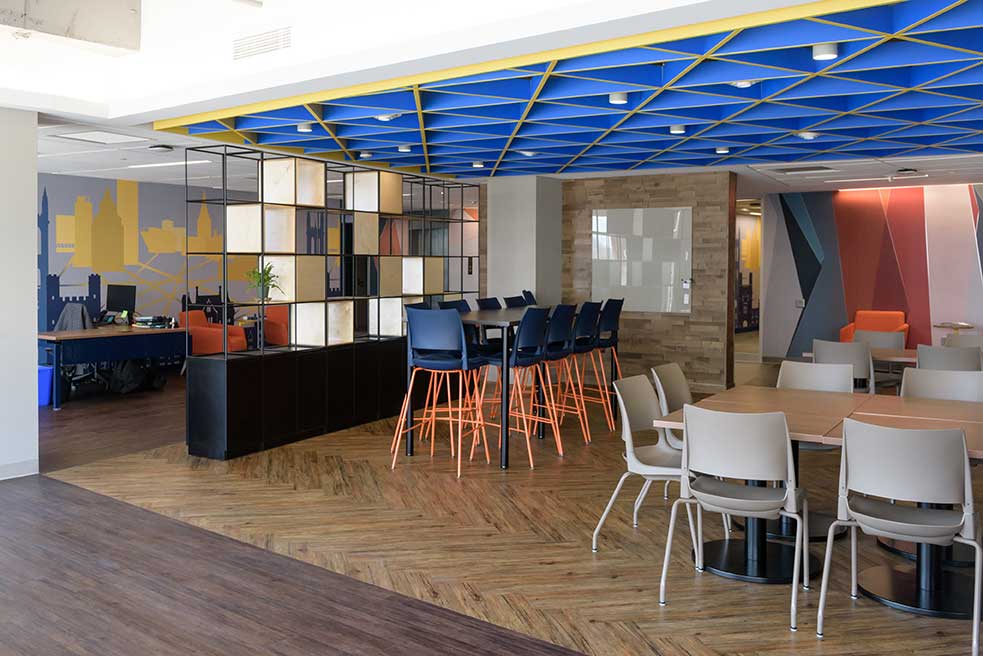
Trinity College has opened the 13,000-square-foot Trinity Innovation Center in downtown Hartford as a space for boundary-crossing collaborations and creativity. The new center—located on the third floor of One Constitution Plaza, directly across the plaza from Trinity’s Liberal Arts Action Lab at 10 Constitution Plaza—will house Trinity’s partnership with Infosys; Digital Health CT, an accelerator led by Startupbootcamp; and new innovation and entrepreneurship programming for students. The center was made possible by a $2.5 million grant from the State of Connecticut and was designed by SLAM Collaborative.
Sonia Cardenas, acting dean of the faculty and vice president for academic affairs, said that the new space downtown signals that Trinity is part of the city’s and state’s initiatives to build an innovation ecosystem that will attract and retain talent. “We have a strong pool of talent and are positioned to bridge the liberal arts with digital technology and innovation,” Cardenas said. “We’re proud to have Trinity be a strong presence in downtown Hartford.”
The Trinity-Infosys partnership, called the Applied Learning Initiative, moved into the center in February. New Infosys employees in the Business Analysis for Digital Transformation program are making use of the large training room and the many flexible work areas and meeting spaces. More than 150 employees have trained through the program, which during the past year had been held at other locations on campus. Each group includes about 25 to 30 liberal arts graduates recruited from Hartford and across the country.
Thalia Giraldo M’19, assistant director of the Applied Learning Initiative and innovation projects, serves as a Trinity liaison to Infosys and oversees the center’s day-to-day operations. “More than 10 Trinity instructors teach in the work-training program,” Giraldo said. “Both Infosys and Trinity feel that liberal arts graduates are the most prepared for the field of digital technology and innovation, which involves critical thinking to generate creative solutions.”

Also slated to move into the Trinity Innovation Center is Digital Health CT, designed to rapidly scale health-care-focused technology start-ups. “The first cycle of the accelerator program just finished at the Liberal Arts Action Lab and hosted its Demo Day in February,” Giraldo said. “The next cohort of start-ups will begin its three-month accelerator program here in the Innovation Center in the fall. Our role is to provide the space for them to work and meet with their partners and to provide Trinity faculty and others who have expertise in the types of services and products that they are working on.”
With Stanley Black & Decker’s own innovation hub also located at One Constitution Plaza and more start-ups coming to the city, Giraldo said, there is a real energy building downtown. “There are a lot of people and organizations in Hartford all thinking about innovation and how to make the city better. I think that being in downtown Hartford provides us with easy, quick resources to build partnerships and strengthen relationships,” she said. “I’m excited for Trinity’s place in this movement of rediscovering what Hartford has to offer and bringing in talent. We’re right in the middle of it.”
Cardenas said that the flexible space is open to all members of the Trinity community as a place to create and collaborate with a cross section of people. “We also hope to introduce student programming around innovation and entrepreneurship open to all majors,” Cardenas said. “We want it to be a space that celebrates our alumni’s accomplishments and where they can interact with students as well as faculty, staff, and leaders from Hartford-area businesses, nonprofits, and government. We are also planning an exciting three-week program this summer for liberal arts students and recent undergraduates from around the country to acquire basic skills in technology and innovation.”
